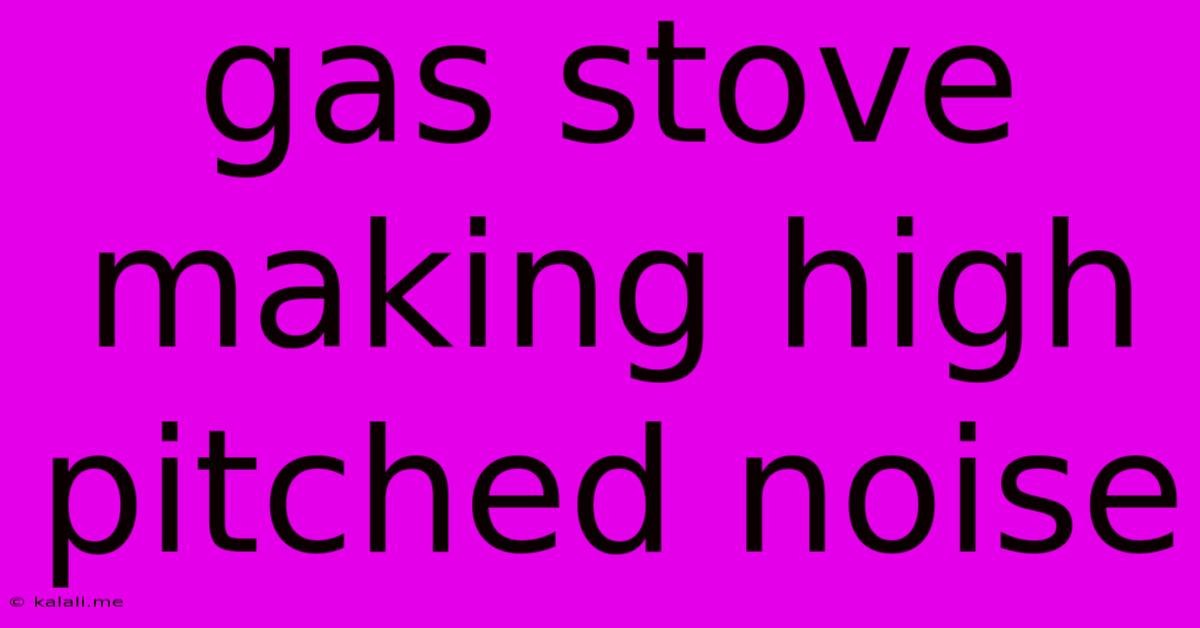Gas Stove Making High Pitched Noise
Kalali
Jun 04, 2025 · 3 min read

Table of Contents
Gas Stove Making a High-Pitched Noise: Troubleshooting and Solutions
Is your gas stove emitting a high-pitched whine or squeal? This annoying sound can be disruptive and worrying, but often points to a relatively simple fix. This article will guide you through the common causes of high-pitched noises from gas stoves and provide practical solutions to silence the irritating squeak. Understanding the source will help you determine whether you can handle the repair yourself or if you need to call a professional.
Common Causes of High-Pitched Noises from Gas Stoves
Several factors can contribute to that unsettling high-pitched sound emanating from your gas stove. Let's delve into the most frequent culprits:
-
Dirty Burners: Accumulated food residue, grease, and spilled liquids can clog the burner ports and disrupt the gas flow. This uneven gas distribution can lead to a whistling or squealing sound. Regular cleaning is crucial for efficient and quiet operation.
-
Igniter Issues: The igniter, responsible for sparking the gas, can produce a high-pitched noise if it's malfunctioning or dirty. This component is subject to wear and tear, and a faulty igniter often requires professional replacement.
-
Gas Pressure Problems: Low gas pressure can force the gas to escape rapidly through the burner ports, creating a high-pitched whistling. This issue requires checking the gas supply line and potentially contacting your gas company.
-
Loose or Damaged Components: Over time, vibrations can loosen screws or components within the stove, leading to rattling or squealing noises. A thorough inspection and tightening of any loose parts can often resolve this problem.
-
Worn-out or Damaged Burner Caps: The burner caps themselves can become worn or damaged, creating uneven gas distribution and resulting in a high-pitched whine. Replacing the burner caps is usually a straightforward solution.
-
Problems with the Gas Valve: A malfunctioning gas valve can contribute to irregular gas flow and potentially cause a high-pitched noise. This issue typically requires the expertise of a qualified gas appliance technician.
Troubleshooting Steps: Silencing the High-Pitched Noise
Before calling a repair service, attempt these troubleshooting steps:
-
Clean the Burners: This is the simplest and most effective solution in many cases. Remove the burner caps and use a wire brush or a specialized cleaning tool to meticulously clean the burner ports. Remove any debris, grease, or food buildup.
-
Inspect the Igniter: Carefully examine the igniter for any visible damage or buildup. If it's dirty, gently clean it with a soft brush or compressed air. However, if it's visibly damaged, replacement is likely necessary.
-
Check for Loose Parts: Inspect the entire stovetop for any loose screws, knobs, or components. Tighten any loose parts securely.
-
Check the Burner Caps: Examine the burner caps for damage or wear. Replace any damaged or excessively worn burner caps.
-
Check Gas Pressure (with caution): If you suspect a low gas pressure issue, check if other gas appliances in your home are functioning correctly. If other appliances are also affected, contact your gas company. Never attempt to adjust gas pressure yourself unless you are a qualified technician.
When to Call a Professional
If the high-pitched noise persists after attempting these troubleshooting steps, or if you notice any signs of gas leaks (smell of gas, unusual flames), it's best to contact a qualified gas appliance technician. Attempting repairs on gas appliances without proper training can be dangerous and should be avoided. Professional service ensures the safety and proper functioning of your gas stove.
By following these steps, you can effectively diagnose and often resolve the cause of a high-pitched noise from your gas stove, ensuring a safer and quieter cooking experience. Remember, safety should always be your top priority.
Latest Posts
Latest Posts
-
How To Get Cigarette Smell Out Of Apartment
Jun 06, 2025
-
Lutheran Vs Campus Crusade For Christ Beliefs Difference
Jun 06, 2025
-
Gas Pump Pre Pay Time Out Refund
Jun 06, 2025
-
Well Water Pressure Drops Then Comes Back
Jun 06, 2025
-
What Should My Car Battery Voltage Be
Jun 06, 2025
Related Post
Thank you for visiting our website which covers about Gas Stove Making High Pitched Noise . We hope the information provided has been useful to you. Feel free to contact us if you have any questions or need further assistance. See you next time and don't miss to bookmark.